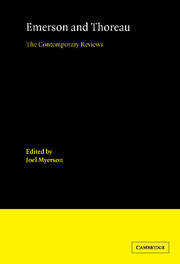Book contents
- Frontmatter
- Contents
- Series Editor's Preface
- Introduction
- RALPH WALDO EMERSON
- Nature (1836)
- “The American Scholar” (1837)
- “Divinity School Address” (1838)
- “Literary Ethics” (1838)
- Essays [First Series] (1841)
- “The Method of Nature” (1841)
- Essays: Second Series (1844)
- Poems (1847)
- Essays, Lectures, and Orations (1847)
- Nature; Addresses, and Lectures (1849)
- Representative Men (1850)
- English Traits (1856)
- The Conduct of Life (1860)
- May-Day and Other Pieces (1867)
- Society and Solitude (1870)
- Letters and Social Aims (1876)
- HENRY DAVID THOREAU
- RETROSPECTIVE ESSAYS BY CONTEMPORARIES
- Index
English Traits (1856)
Published online by Cambridge University Press: 23 March 2010
- Frontmatter
- Contents
- Series Editor's Preface
- Introduction
- RALPH WALDO EMERSON
- Nature (1836)
- “The American Scholar” (1837)
- “Divinity School Address” (1838)
- “Literary Ethics” (1838)
- Essays [First Series] (1841)
- “The Method of Nature” (1841)
- Essays: Second Series (1844)
- Poems (1847)
- Essays, Lectures, and Orations (1847)
- Nature; Addresses, and Lectures (1849)
- Representative Men (1850)
- English Traits (1856)
- The Conduct of Life (1860)
- May-Day and Other Pieces (1867)
- Society and Solitude (1870)
- Letters and Social Aims (1876)
- HENRY DAVID THOREAU
- RETROSPECTIVE ESSAYS BY CONTEMPORARIES
- Index
Summary
Mr. Emerson crossed the seas to lecture to us—he re-crossed them to lecture at us. The first man he talked to in England was Coleridge—the last Mr. Carlyle; and between the first word and the last—as here recorded—there is an interval of talk, some of it pleasant, more of it eccentric, and not a little of it dreary. On the whole, England has been happy enough to please her critic; yet, with all his politeness and rosy compliments, Mr. Emerson leaves us with an impression that America, not England, is the true seat of the Saxon race. The same imperial character has been claimed, by various writers, for the Isle of Thanet, and for Guernsey and Jersey. Mr. Emerson likes our people, with a few drawbacks and qualifications, which he must record and deplore,—such as our want of wit and fancy; but we suspect he likes us chiefly for those qualities of mind and character in which he finds some resemblances to qualities nearer home. In fact, Mr. Emerson, when painting the model Englishman to his friends in the United States, is evidently thinking of the Broadway rather than the Strand; and the faults which he finds with us we read of with perfect good humour, because we know they are not our faults, so much as they are our neighbours'. For example, when he writes:—“A strong common sense, which it is not easy to unseat or disturb, marks the English mind for a thousand years; a rude strength newly applied to thought, as of sailors and soldiers who had lately learned to read.
- Type
- Chapter
- Information
- Emerson and ThoreauThe Contemporary Reviews, pp. 256 - 283Publisher: Cambridge University PressPrint publication year: 1992



